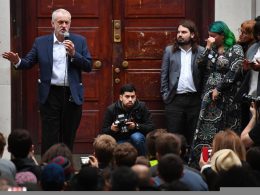Time to strike a united blow against EU / Troika austerity! For a European-wide day of general strikes and mobilisations this autumn! Towards a 24-hour all-European general strike!
The opening weeks of the autumn have been full of signs of what is to come. Capitalist politicians all over Europe returned from their summer holidays to unleash further attacks on working, young and unemployed people, with renewed vigour. In Portugal, Greece, Britain, France and elsewhere, new austerity measures and packages have been announced. This past week alone, über-austerity packages were agreed in Spain and Greece, adding to the spiral of misery and suffocating already-depressed economies. These come as the latest in a never-ending series of blows to the living standards and welfare state of the majority; further steps in the process of bleeding us dry in an attempt to overcome capitalism’s crisis.
But these attempts are clearly failing. Economic data shows how deepening recessions and slowdowns to a “zero-growth” position are hitting not only the struggling peripheral ‘PIIGS’ (Portugal, Ireland, Italy, Greece and Spain) countries, but seeing slowdowns develop in so-called “strong core” countries, such as France and Germany. All this is against a background of a slowdown in the world economy that also threatens the livelihoods of tens of millions outside Europe. And as this economic disaster unfolds, the lords of the system seem no more clued-in as to how to manage or solve it, and are divided amongst themselves with no clear idea of how to proceed. The increasingly accepted inevitability of Greek exit from the eurozone, as well as increasing speculation about the exit of other countries, shines a light on this. While the governments and big business are desperate to avoid such a break-up, they see no lasting way of preventing it and attempts are being made to prepare for splits in the eurozone. The capitalist system is showing itself incapable of bringing stability and growth to Europe, governed only by the chaos and avarice of the profit system and dictatorship of the market. This is driving the continent further down the path towards ruin.
Autumn struggle starts with a bang in Southern Europe
Autumn started with a big bang of mass resistance and struggle. Millions all over Europe are drawing the conclusion that workers’ struggle is the only means to resist and avoid a ruinous path. This was shown last weekend alone, when on Saturday the Iberian Peninsula (Spain and Portugal) saw a simultaneous explosion of revolt from below whilst tens of thousands took to the streets of Paris. In Portugal on 15 September, the biggest demonstration since the revolution of 1974 shook the previously “stable” coalition government to its foundations putting its immediate survival into question. It was followed 5 days later by a “vigil” of tens of thousands outside the Council of State meeting to demand the government’s resignation. Then, on Saturday, 29 September, hundreds of thousands attended the protest called by the CGTP, the streets of Lisbon ringing with demands for expulsion of the ‘Troika’ (IMF, ECB and EU) and for a general strike to kick the government out while it is down.
The magnificent struggles of the Portuguese working people have also provided us with autumn’s first victory. The government was forced to withdraw its brutal attack that would have meant workers losing one month’s pay, a year, while granting new tax breaks for bosses. This outcome, although a temporary and partial victory, must be lauded across the continent, it is the first time since this crisis began that a government has been forced to retreat from a major attack. It is a fitting rebuttal to those who maintain that the diktats of the markets and big business are unchallengeable. This has been a warning to all European governments; such is the groundswell of anger and bitterness that a single measure can ignite a mass opposition movement.
However, the Portuguese government has now returned to the offensive, announcing what it itself calls “enormous” tax increases to replace the rise in social security contributions it was forced to withdraw. This is a new challenge to the movement in Portugal. Unfortunately the largest trade union, the CGTP, has only announced a one day general strike for November 14, after the government’s budget is due to have been voted upon in parliament. A serious struggle to defeat these attacks needs far more than token protest actions. It requires a serious strategy with the goal of ousting governments implementing capitalism’s austerity.
At the same time as the Portuguese protests, Madrid saw an eruption of rage against the Rajoy administration, when tens of thousands surrounded parliament, demanding the government’s fall. This, the second “surrounding” of parliament by tens of thousands within 5 days, comes as the latest protest in the midst of an intense period of mobilisations – with up to half a million marching in Madrid behind trade union banners on 15 September, and a general strike in the Basque country on 26 September. The following weekend saw around 40,000 protesting in six German cities, while over 50,000 took to the streets of Paris against the EU’s rotten austerity treaty which enshrines cuts policies into national law. This followed the events in Greece on 26 September. The Greek workers, perhaps representing Europe’s most advanced devastation of lives and livelihoods under the boot of austerity and the Troika, “greeted” their new pro-Troika government with one of the most powerful displays of workers’ power in recent years, in a colossal general strike.
Even outside of these countries, in themselves epicentres of the fight back in Europe so far, a new stormy phase is opening up. This is shown by the British Trade Union Congress’ (TUC) decision to consider general strike action which would be the first of its kind in over 80 years.
Trade unions must organise a European-wide coordinated struggle! For a European-wide day of general strikes and protests this autumn!
This is the backdrop against which the Committee for Workers’ International calls on all forces in the European working class movement and the Left, to unite around a coordinated programme of struggle, to translate this organic Europe-wide revolt against austerity policies into an organised European-wide blow to capitalist governments, the Troika and the markets and bondholders. At various occasions throughout the crisis, the leaders of the European Trades’ Union Congress (ETUC) have under pressure organised European-wide actions and initiatives, including European protests in Brussels and Budapest, which drew tens of thousands of participants. However, these actions have mainly been of a symbolic character and not represented a genuine coordination of the growing workers’ and young people’s struggles around the continent.
The ETUC will meet in Spain on 17 October, which will present an important opportunity. The two largest Spanish trade union centres, the CC.OO and UGT, have raised the idea of co-ordinated strike action in southern Europe, with at least an Iberian general strike on 14 November on the cards. This would be a significant step, representing international workers’ action on a higher level than seen before. However, the potential exists to go even further, with a determined fight by working class militants in Greece, Italy, the UK and other countries to push their union leaderships into calling general strike action and protests on the same date. If seriously acted upon, this would be a significant step.
Already there have been a series of missed opportunities, such as in March 2012 when powerful general strikes rocked Spain and Portugal within 7 days of each other, and 15 October 2011, when hundreds of thousands of young people, mobilised by the ‘indigandos’ and ‘occupy’ movements, took to the streets throughout Europe and the US. For example, a European trade union leadership serious about organising an international fight back could have relatively easily, through the movement’s international structures such as the ETUC, coordinated the Spanish and Portuguese general strikes last March to take place on the same day. This action could have been extended to Greece, where a new radicalisation was developing, and Italy where a general strike has been fought for by militant trade union activists as a response to capitalism’s offensive. International action like this would have an electrifying impact, and could transform the situation. It would both show the power of the labour movement, mobilised in its international strength and dimensions, and also immeasurably boosted the confidence and combated the isolation of workers in countries like Greece, whose heroic resistance to Troika austerity provides an inspiration for all those facing the assault of cuts and capitalism.
We cannot allow yet more opportunities to go amiss. The Committee for a Workers’ International (CWI) has consistently defended the need for European-wide resistance, standing for the coordination of strikes and demonstrations across borders, setting the horizon of a European-wide general strike. We also struggled to translate this into action, with international initiatives which won wide support amongst activists in the European left and workers’ movement, which we fought to popularise including through the work of Paul Murphy, Socialist Party (CWI in Ireland) MEP in the European parliament and GUE United Left group. However, at the same time, we stress that such international action must not be seen as an alternative or substitute for determined action in each country to defend living standards; the trade union leaders must not be allowed to use international action as a diversion. For the CWI national and international action goes hand in hand.
We now call on trade unionists, workers and young people in struggle to bring enormous pressure to bear on the ETUC leaders, in favour of a change in approach, and a serious international plan of joint resistance, starting from the struggles already taking place and being planned in different countries. As has been shown in Britain with the example of the National Shop Stewards’ Network, organised opposition from below can force even the most conservative trade union bureaucracies into action. An international day of struggle this autumn, possibly on November 14, could feature a coordinated general strike in Spain, Portugal, Greece, Italy and elsewhere, with mass solidarity demonstrations and actions in all countries. As European capitalism languishes in chaos and crisis, such a day would send a mighty message of strength and determination from a united working class movement. However, in contrast to the policies of the vast majority of trade union leaders who see no alternative to capitalism, this fight back must be armed with a socialist alternative to the attacks and misery imposed by the capitalist EU. This could also bring the spectre of an all-European general strike, to mobilise the full power of our movement on a continental scale, within reach.
Down with the capitalist EU! For a democratic socialist Europe!
Workers and youth will continue to resist, faced with the social nightmare of mass unemployment and growing impoverishment, including of the middle classes. This makes itself felt particularly among the young generation, with youth unemployment taking on massive proportions (over 50% in Greece and Spain), and the spectre of mass emigration returning to countries like Portugal and Ireland. The promises of a better future, or of a short-lived period of “sacrifices” which would give way to economic growth, are being shattered day by day. This has resulted in those governments elected on the basis of such promises being quickly thrown into crisis. Governments in Ireland, Spain, Portugal, France and the UK have been exposed as weak before the chaos of the crisis and explosive pressure from below, with the demand for them to fall gathering mass momentum in protests in Spain and Portugal. In recent months, governments in the Netherlands and France joined the list of those already disposed with.
In these last two examples, we also saw examples of a mass radicalisation and search for political alternatives to the austerity consensus – the rise (and setbacks) of the Dutch Socialist Party, and the Front de Gauche in France. This followed the astonishing rise of Syriza in Greece, to challenge for power in the June elections. In Portugal, the parties of the anti-capitalist left (Left Bloc and Communist Party) are currently scoring a combined 25% in opinion polls, putting a struggle for power on the basis of a united front, within reach. These developments represent key steps forward for the struggle of the working class and youth for an alternative path to capitalist misery.
Following the transformation of the social democratic parties into almost completely pro-capitalist formations in the last decades following the fall of the Berlin Wall, the CWI has consistently put forward the need for new mass parties of the working class to be built. Formations like the Front de Gauche and Syriza are potentially crucial steps in this direction. This necessity is now ever-more sharply posed, as the situation of capitalist crisis places so bluntly on the table the need for workers and youth in struggle to mount a challenge for political power to implement an alternative socialist programme. The ominous gains made by ‘Golden Dawn’ in Greece, show the danger of the fascist and racist far right partially filling the vacuum left open if the working class movement and left do not show a clear way out. This must also be actively resisted in an organised way across Europe.
The CWI believes that such a programme should begin with the need to reject the payment of the illegitimate national debt – an instrument of capitalist blackmail which the rich are responsible for, but try to hang around our necks – and for massive investment in public works and jobs programmes, initially funded by massive taxes on the idle trillions held by the super-rich. The aim must be to replace pro-capitalist governments with governments that are not instruments of the elite but implement the demands of, and are responsible to, working people, youth, pensioners and the poor. The nationalisation of the banks and commanding heights of the economy, under the democratic control and management of the working class, could allow for this wealth to be put to work in the development of an economic plan for the regeneration of national economies and the European economy, to create jobs and to guarantee a decent future to the young generation. The Euro and capitalist EU, as shown by the new quasi-legal commitment to austerity enshrined in the ‘fiscal pact treaty’, is no mechanism within which such a solution can be fought for. A coordinated struggle across Europe, against EU/Troika austerity and for a socialist alternative, would show the basis for an alternative European democratic socialist confederation of countries.
The CWI calls for:
- No to cuts and austerity! Make the rich and big business pay for the crisis!
- No to the misery of mass unemployment! For massive public jobs’ creation programmes to be funded by massive public investment!
- No payment of the speculators’ debts assumed by capitalist governments! Reject the “re-payments” and brutal austerity programmes which go with them! Expel the Troika
- For heavy taxes on the trillions of Euros in the reserves of the rich and big business to find public works programmes! Impose capital controls and a public state monopoly on imports and exports to prevent a “flight of capital”!
- Nationalise the banks, financial sector and key sectors of the economy under democratic workers’ control and management! For an democratic socialist plan to regenerate the economy and living standards
- The immediate European-wide coordination of the struggles against austerity! For a European-wide day of general strikes and protests this autumn! Towards an all-European general strike of 24 hours
- For mass, democratic political organisations of the working class to fight for workers’ governments to implement socialist policies
- Down with the capitalist EU! For an alternative democratic socialist confederation of countries in Europe












